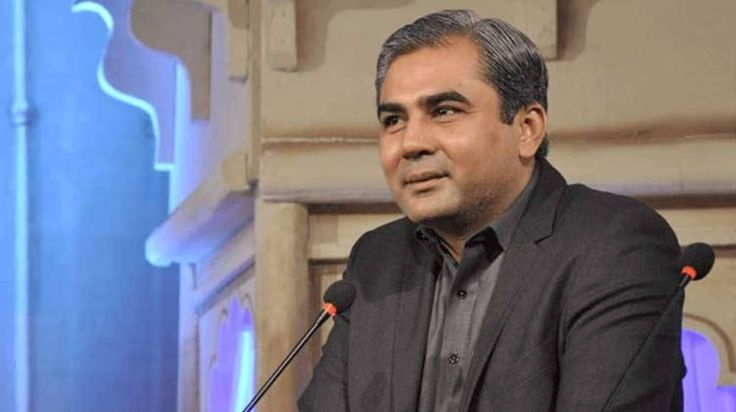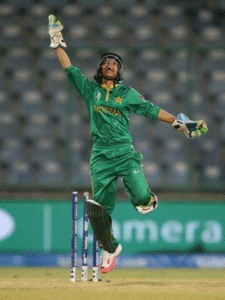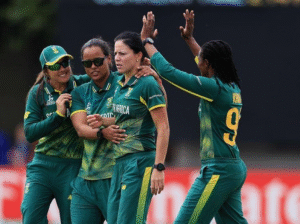
ACC chief Mohsin Naqvi remains firm on holding a formal ceremony in Dubai for India’s Asia Cup trophy handover amid growing pressure from the BCCI and political tensions between the two cricketing giants.
Mohsin Naqvi Stands Firm on Asia Cup Trophy Ceremony
The standoff between India and Pakistan over the Asia Cup 2025 trophy handover continues to dominate headlines, with Asian Cricket Council (ACC) president Mohsin Naqvi adamant about hosting a formal presentation ceremony in Dubai despite growing pressure from the Board of Control for Cricket in India (BCCI).
Sources in Indian media revealed that the BCCI has formally contacted Naqvi, who also serves as the Pakistan Cricket Board (PCB) chairman, urging him to hand over the trophy to India after the team refused to accept it during the Asia Cup’s chaotic closing ceremony last month.
Speaking to reporters in Karachi, Naqvi confirmed that the ACC has scheduled a trophy presentation ceremony for December 10 in Dubai, stating that India will officially receive the trophy there.
“I will personally hand over the trophy as the ACC president,” Naqvi said. “This will be a formal ceremony, as it should have been on the day of the final.”
A Controversial Finale Overshadows India’s Asia Cup Triumph
Defending champions India clinched the Asia Cup 2025 title last month with a thrilling five-wicket victory over Pakistan in the final at the Dubai International Stadium.
However, instead of a celebration befitting the magnitude of the occasion, the post-match scenes turned awkward and politically charged. The Indian team refused to collect the trophy from Naqvi, leaving the podium empty and the atmosphere tense.
Spectators and television viewers were left stunned as the trophy presentation was called off entirely. The incident quickly went viral on social media, with critics accusing both cricket boards of letting political tensions overshadow the spirit of sport.
Pakistan captain Salman Agha called India’s actions “disrespectful to cricket,” while Indian skipper Suryakumar Yadav claimed his team had been “denied” the opportunity to receive the trophy.
“It was unfortunate to see what should have been a proud moment for both nations turn into a controversy,” said one ACC official. “This was supposed to be a tournament that brought Asian cricket together.”
Political Tensions Spill Onto the Cricket Field
The Asia Cup, which took place from September 9 to 28 in the UAE, was played against the backdrop of heightened tensions between the two nuclear-armed neighbours.
Just months before the tournament, the Pahalgaam attack in Indian-occupied Kashmir had strained bilateral relations once again, claiming the lives of 26 local tourists. The fallout extended beyond politics — right into cricket.
When India and Pakistan met during the group stage in Dubai, there were no customary pre-match handshakes between players. The tension carried onto the field, where sledging and on-field confrontations added to the uneasy atmosphere.
The animosity intensified in the Super Four stage, where verbal exchanges between players further marred what should have been a high-quality cricket spectacle.
Indian captain Suryakumar Yadav came under heavy criticism for politicising his post-match comments, referencing the Pahalgaam attack and the Indian armed forces. On the other hand, the Pakistan camp avoided the media entirely, choosing silence over confrontation.
Mohsin Naqvi’s Response: “If They Want It, Come Get It”
Following the dramatic final, Naqvi took to social media to address the controversy. On his X (formerly Twitter) account, he wrote:
“If they truly want it, they are welcome to come to the ACC office and collect it from me.”
His post sparked both praise and outrage, with supporters commending his firmness and detractors accusing him of fueling the rift. Yet, Naqvi maintained that the ACC’s stance is about protocol, not politics.
According to Dawn.com’s understanding, Naqvi believes the Asia Cup — as a continental event — must uphold professionalism, regardless of political disagreements. “It’s about preserving the dignity of cricket,” said a PCB insider.
India Increases Pressure, Backed by Allies
Indian media reported that the BCCI, backed by Sri Lanka and Afghanistan Cricket Boards, has written to the ACC urging Naqvi to send the trophy to India without ceremony.
The Press Trust of India (PTI) quoted an ACC source as saying:
“Naqvi has insisted that a BCCI representative must collect the trophy from him at the ACC headquarters in Dubai, but the Indian board has rejected that stance.”
The source further revealed that the BCCI will raise the issue at the next ICC meeting, expected to be held in early 2026.
The joint letter to Naqvi, reportedly signed by BCCI secretary Rajeev Shukla and representatives from Sri Lanka and Afghanistan, called for “a smooth resolution that avoids further controversy.”
Behind the Dispute: Cricket and Diplomacy Collide
Cricket diplomacy between India and Pakistan has always been complicated. With no bilateral series since 2012, both teams meet only in multi-nation tournaments such as the Asia Cup or ICC events.
The Asia Cup has often mirrored the political landscape — periods of peace bring cautious friendliness, while political unrest manifests in cold gestures, tense press conferences, and canceled tours.
Experts note that Naqvi’s firm stance on the trophy handover stems from his desire to preserve the ACC’s authority, which he feels has been undermined by the BCCI’s growing influence in Asian cricket politics.
A senior sports journalist in Karachi said, “This is about much more than a trophy. It’s about who controls the narrative in Asian cricket. Naqvi wants to show that the ACC operates independently — not under the shadow of the BCCI.”
The BCCI’s Perspective
The BCCI, for its part, insists that its actions are motivated by professionalism, not politics. Sources within the board argue that India’s players refused to collect the trophy because of “procedural confusion,” claiming that the ceremony’s coordination was unclear and communication from the ACC had broken down.
However, critics within India have accused the BCCI of letting political sentiment influence the team’s behavior. “This was a moment to rise above differences,” wrote an Indian columnist. “Instead, it became another headline in a never-ending rivalry.”
The BCCI has emphasized that India “earned the trophy on merit” and should not have to participate in “symbolic ceremonies that carry political undertones.”
A Pattern of Tension
This is not the first time the two cricket boards have clashed over tournament logistics and protocol. In past years, disputes have erupted over venue selection, match scheduling, and player travel permissions.
During the buildup to this year’s Asia Cup, the BCCI opposed the idea of Pakistan hosting any matches, citing security concerns. The tournament was ultimately shifted to the UAE as a neutral venue — a compromise that left neither side fully satisfied.
Now, the trophy controversy has added another layer of strain, with both boards unwilling to back down.
Reaction from the Cricketing World
The international cricket community has watched the episode unfold with a mix of disbelief and concern. Former players and commentators have called for cooler heads to prevail.
Former Pakistani all-rounder Shahid Afridi urged restraint: “Cricket is meant to unite people. The Asia Cup final should have been a celebration of great cricket, not an argument over politics.”
Meanwhile, former Indian opener Aakash Chopra said on his YouTube channel, “This could have been handled better by both sides. Let’s not turn sportsmanship into a political statement.”
Social media has been equally divided. Hashtags such as #AsiaCupTrophyRow and #CricketNotPolitics have trended across both countries, reflecting how deeply cricket is intertwined with national pride.
ACC’s Dilemma and the Road Ahead
The Asian Cricket Council, headquartered in Dubai, now faces the difficult task of resolving the issue diplomatically. As the regional body governing Asian cricket, the ACC must balance fairness, protocol, and the sensitivities of its most powerful member — India.
Insiders suggest that Naqvi’s insistence on a formal presentation ceremony is meant to reaffirm the ACC’s independence. “He doesn’t want to set a precedent where one board dictates how continental trophies are handed over,” said an ACC source.
The scheduled December 10 ceremony in Dubai is expected to be attended by ACC representatives from all member nations. Whether India will participate remains uncertain.
Broader Implications for Asian Cricket
Analysts warn that this dispute could have long-term implications for Asian cricket cooperation. The Asia Cup — one of the continent’s oldest and most prestigious tournaments — has often served as a bridge between rival nations.
If left unresolved, the trophy controversy risks damaging the credibility of the ACC and undermining future collaboration on regional events.
“This is not just about optics,” said a cricket administrator from Sri Lanka. “The Asia Cup is supposed to showcase unity through sport. If the politics keep seeping in, it hurts everyone — from players to fans to sponsors.”
Conclusion: A Test of Leadership and Maturity
As the December deadline for the trophy ceremony approaches, all eyes will be on Mohsin Naqvi and the ACC’s handling of the situation. His decision to stand firm has earned him both praise and criticism — viewed by some as principled, and by others as unnecessarily provocative.
For India, the focus remains on asserting its influence in global cricket governance, while for Pakistan, the episode is an opportunity to defend its dignity on the international stage.
Ultimately, the Asia Cup trophy dispute is a reflection of a much deeper challenge — one that extends beyond cricket and into the realm of politics, pride, and power.
Whether the trophy handover in Dubai can help restore sportsmanship between India and Pakistan remains to be seen. But one thing is certain: the world will be watching when — and if — the ceremony finally takes place.
Internal Linking Suggestions:
- Link “Asia Cup 2025 final” to your tournament review post.
- Link “Mohsin Naqvi ACC president” to a profile or leadership article.
- Link “India vs Pakistan cricket rivalry” to a historical feature post.
- Link “BCCI and PCB relations” to an analysis of board-level tensions.



